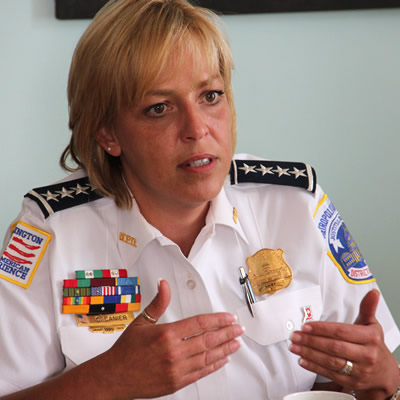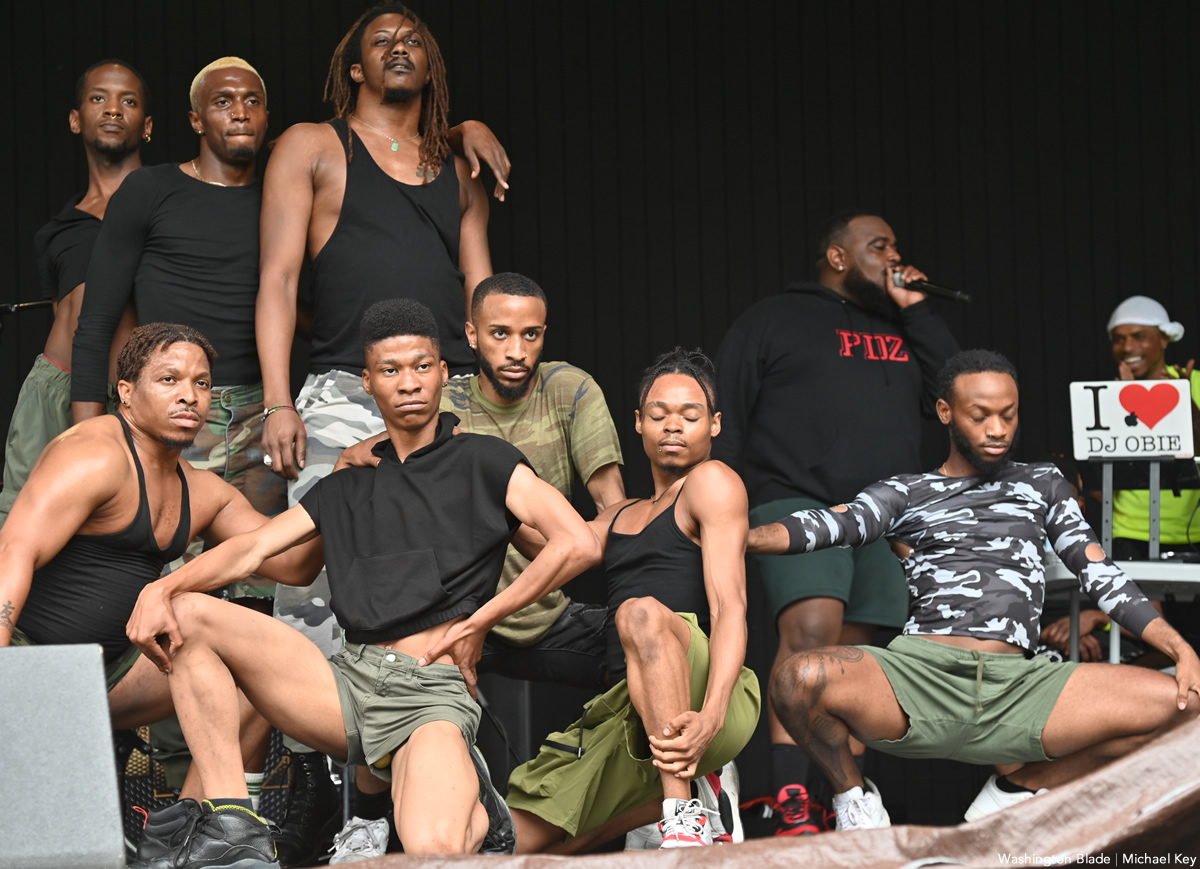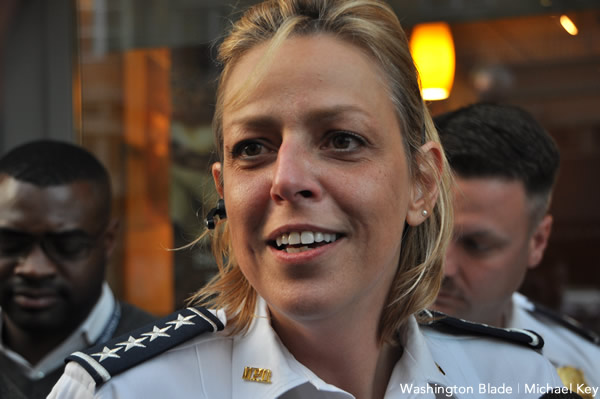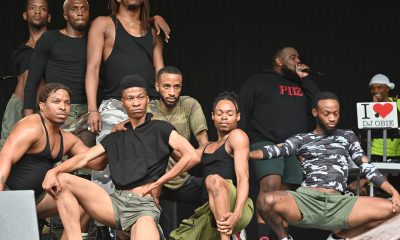Local
Trans group: D.C. hate crimes review biased toward police
Emails from police chief ‘raise questions’ about independence task force

More than 1,500 pages of private email correspondence from D.C. Police Chief Cathy Lanier related to the work of the city’s Hate Crimes Review Task Force show that the Task Force may be biased in favor of the police and may not present an impartial assessment of police handling of hate crimes, according to the D.C. Trans Coalition.
In written testimony submitted on Wednesday to the D.C. Council’s Committee on the Judiciary and Public Safety, DCTC disclosed it obtained the Lanier email correspondence through a Freedom of Information Act request earlier this year.
DCTC’s testimony says much of the email correspondence is between Lanier and David Friedman, director of the Anti-Defamation League’s Washington regional office, who serves as chair of the Hate Crimes Review Task Force.
“Our concern is that the ADL-led task force is a publicity stunt rather than a good-faith effort at making progress,” the DCTC statement says.
Lanier and Friedman dispute the DCTC’s assessment, saying they expect the task force to provide an independent review of the department’s response to anti-LGBT hate crimes and to make recommendations on how the response can be improved.
“It is a shame that the D.C. Trans Coalition is attacking the work of this group before they even issue their report and recommendations,” Lanier told the Washington Blade in a statement.
Lanier’s office announced last June that she enlisted the ADL, a nationally recognized group that fights prejudice and discrimination, to help the department assess how it investigates and reports hate crimes. The announcement came at a time when LGBT activists raised concerns over the police handling of hate crimes targeting the LGBT community, especially the transgender community.
The police announcement said that at ADL’s invitation, the Human Rights Campaign, the National Center for Transgender Equality, the Leadership Conference on Civil Rights, and two university professors considered experts on hate violence agreed to join ADL as members of the task force.
DCTC says in its testimony submitted to the D.C. Council that the email correspondence between Lanier and Friedman suggests a bias exists that the task force may not be impartial.
“We received the [FOIA] results last month, five month late, only to discover evidence that the independent review isn’t really independent at all,” DCTC says in its testimony.
Freedman “appears to be a close personal friend of Chief Lanier,” the testimony says. “Further, Lanier personally approved the membership of the review task force,” a development DCTC says raises questions about its ability to make an impartial assessment of the police department’s handling of hate crimes targeting the LGBT community.
The DCTC testimony says the group learned last week at a private task force meeting held at offices of Casa Ruby, a D.C. LGBT community center with an outreach to the Latino community, that the task force will submit its findings to Chief Lanier to give her a chance to respond.
DCTC member Jason Terry told the Blade on Wednesday that a task force representative told activists attending the Casa Ruby meeting that it would be up to Lanier to decide when or if the report should be released to the public and the community.
One of the email exchanges DCTC included in its testimony, which is dated Nov. 3, 2011, shows Friedman mentioning in a lighthearted way that Lanier’s high performance ratings in a public opinion poll of 80 percent may be equivalent to a “B” on a report card.
“Actually the last Clarus poll was 84 percent. Am I slipping?” Lanier said in her response.
“Wouldn’t worry,” Friedman said in his response. “The only people who don’t like you have outstanding warrants.”
Replied Lanier: “That David is one of the many reasons I love you…So quick.”
In a phone interview on Wednesday afternoon, Friedman told the Blade his remark about outstanding warrants was a joke. He also noted that his Nov. 3 email exchange with Lanier that DCTC quoted took place at least a month before Lanier informed him of her plans for the task force and asked him to create it.
“Yes, I am lucky to call David a friend, as are many law enforcement leaders in the country,” Lanier said in her statement to the Blade. “He is a highly respected professional dedicated to making communities throughout the country safe from crime motivated by hate.”
LGBT activists who know Friedman have said he and the ADL’s D.C. regional office have been strong and outspoken advocates for LGBT rights for many years.
“We’re very proud of that,” Friedman said. “We’re proud of our leadership on hate crimes on the local and national level. And I hope that people will feel when this process is done that the task force contributed significantly to protecting the LGBT community from hate crimes and to strengthening the relationship between the LGBT community and the MPD.”
One task force member, who spoke on condition of not being identified, said the DCTC appears to have made a “premature judgment” in assessing whether the task force is biased or whether the outcome of the task force’s work would be biased.
HRC spokesperson Paul Guequierre said in a statement that ADL asked HRC to join the task force because of HRC’s “extensive work on hate crimes prevention legislation at both the state and federal levels.” He said HRC saw its participation in the task force as an opportunity to make sure “there was a fair process” in assessing the police handling of hate crimes in D.C.
“HRC is committed to ensuring that law enforcement respond swiftly and appropriately to incidents of bias crimes without further victimizing the LGBT community,” he said.
Friedman acknowledged that it was he who told people attending the task force community meeting at Casa Ruby’s that the task force’s findings and recommendations would be delivered to Lanier.
“What I said at that meeting was that the chief asked us to review the MPD handling of hate crimes and its relationship with the LGBT community was to be reviewed,” he said. “So obviously we’re going to give her first the report and our findings. She asked for this. And I have every reason to expect – I think all of us would want – these findings to be made public.”
District of Columbia
New D.C. LGBTQ+ bar Crush set to open April 19
An ‘all-inclusive entertainment haven,’ with dance floor, roof deck

D.C.’s newest LGBTQ+ bar called Crush is scheduled to open for business at 4 p.m. on Friday, April 19, in a spacious, two-story building with a dance floor and roof deck at 2007 14th St., N.W. in one of the city’s bustling nightlife areas.
A statement released by co-owners Stephen Rutgers and Mark Rutstein earlier this year says the new bar will provide an atmosphere that blends “nostalgia with contemporary nightlife” in a building that was home to a popular music store and radio supply shop.
Rutgers said the opening comes one day after Crush received final approval of its liquor license that was transferred from the Owl Room, a bar that operated in the same building before closing Dec. 31 of last year. The official opening also comes three days after Crush hosted a pre-opening reception for family, friends, and community members on Tuesday, April 16.
Among those attending, Rutgers said, were officials with several prominent local LGBTQ organizations, including officials with the DC Center for the LGBTQ Community, which is located across the street from Crush in the city’s Reeves Center municipal building. Also attending were Japer Bowles, director of the Mayor’s Office of LGBTQ Affairs, and Salah Czapary, director of the Mayor’s Office of Nightlife and Culture.
Rutgers said Crush plans to hold a grand opening event in a few weeks after he, Rutstein and the bar’s employees become settled into their newly opened operations.
“Step into a venue where inclusivity isn’t just a promise but a vibrant reality,” a statement posted on the Crush website says. “Imagine an all-inclusive entertainment haven where diversity isn’t just celebrated, it’s embraced as the very heartbeat of our venue,” the statement says. “Welcome to a place where love knows no bounds, and the only color or preference that matters is the vibrant tapestry of humanity itself. Welcome to Crush.”
The website says Crush will be open Tuesdays and Wednesdays from 4 p.m. to 12 a.m., Thursdays from 4 p.m. to 2 a.m., Fridays from 4 p.m. to 3 a.m., Saturdays from 2 p.m. to 3 a.m., and Sundays from 2 p.m. to 12 a.m. It will be closed on Mondays.
Crush is located less than two blocks from the U Street Metro station.
District of Columbia
Reenactment of first gay rights picket at White House draws interest of tourists
LGBTQ activists carry signs from historic 1965 protest

About 30 LGBTQ activists formed a circular picket line in front of the White House Wednesday afternoon, April 17, carrying signs calling for an end to discrimination against “homosexuals” in a reenactment of the first gay rights protest at the White House that took place 59 years earlier on April 17, 1965.
Crowds of tourists looked on with interest as the activists walked back and forth in silence in front of the White House fence on Pennsylvania Avenue. Like the 1965 event, several of the men were dressed in suits and ties and the women in dresses in keeping with a 1960s era dress code policy for protests of the Mattachine Society of Washington, D.C., the city’s first gay rights group that organized the 1965 event.
Wednesday’s reenactment was organized by D.C.’s Rainbow History Project, which made it clear that the event was not intended as a protest against President Joe Biden and his administration, which the group praised as a strong supporter of LGBTQ rights.
“I think this was an amazing event,” said Vincent Slatt, the Rainbow History Project official who led efforts to put on the event. “We had twice as many that we had hoped for that came today,” he said.
“It was so great to see a reenactment and so great to see how far we’ve come,” Slatt said. “And also, the acknowledgement of what else we still need to do.”
Slatt said participants in the event who were not carrying picket signs handed out literature explaining the purpose of the event.
A flier handed out by participants noted that among the demands of the protesters at the 1965 event were to end the ban on homosexuals from working in the federal government, an end to the ban on gays serving in the military, an end to the denial of security clearances for gays, and an end of the government’s refusal to meet with the LGBTQ community.
“The other thing that I think is really, really moving is some of the gay staff inside the White House found out this was happening and came out to greet us,” Slatt said. He noted that this highlighted how much has changed since 1965, when then President Lyndon Johnson’s White House refused to respond to a letter sent to Johnson from the Mattachine Society explaining its grievances.
“So now to have gay people in the White House coming out to give us their respects and to say hello was especially meaningful to us,” Slatt said. “That was not expected today.”
Among those walking the picket line was longtime D.C. LGBTQ rights advocate Paul Kuntzler, who is the only known surviving person who was among the White House picketers at the April 1965 event. Kuntzler said he proudly carried a newly printed version of the sign at Wednesday’s reenactment event that he carried during the 1965 protest. It stated, “Fifteen Million Homosexuals Protest Federal Treatment.”
Also participating in the event was Japer Bowles, director of D.C. Mayor Muriel Bowser’s Office of LGBTQ Affairs. Bowles presented Slatt with a proclamation issued by Bowser declaring April 17, 2024, Mattachine Society Day in Washington, D.C.
“Whereas, on April 17, 1965, the Mattachine Society of Washington courageously held the nation’s inaugural picket for gay rights, a seminal moment in the ongoing struggle for LGBTQIA+ equality in the United States, marking the genesis of public demonstrations advocating for those rights and paving the way for Pride Marches and Pride celebrations worldwide,” the proclamation states.
About 30 minutes after the reenactment event began, uniformed Secret Service agents informed Slatt that due to a security issue the picketers would have to move off the sidewalk in front of the White House and resume the picketing across the street on the sidewalk in front of Lafayette Park. When asked by the Washington Blade what the security issue was about, one of the Secret Service officers said he did not have any further details other than that his superiors informed him that the White House sidewalk would have to be temporarily cleared of all people.
Participants in the event quickly resumed their picket line on the sidewalk in front of Lafayette Park for another 30 minutes or so in keeping with the 1965 picketing event, which lasted for one hour, from 4:20 p.m. to 5:20 p.m., according to Rainbow History Project’s research into the 1965 event.
Although the LGBTQ picketers continued their procession in silence, a separate protest in Lafayette Park a short distance from the LGBTQ picketers included speakers shouting through amplified speakers. The protest was against the government of Saudi Arabia and organized by a Muslim group called Al Baqee Organization.
A statement released by the Rainbow History Project says the reenactment event, among other things, was a tribute to D.C.-area lesbian rights advocate Lilli Vincenz, who participated in the 1965 White House picketing, and D.C. gay rights pioneer Frank Kameny, who founded the Mattachine Society of Washington in the early 1960s and was the lead organizer of the 1965 White House protest. Kameny died in 2011 and Vincenz died in 2023.
The picket signs carried by participants in the reenactment event, which were reproduced from the 1965 event, had these messages:
• “DISCRIMINATION Against Homosexuals is as immoral as Discrimination Against Negroes and Jews;”
• “Government Should Combat Prejudice NOT PROMOTE IT”
• “White House Refuses Replies to Our Letters, AFRAID OF US?
• “HOMOSEXUALS Died for their Country, Too”
• “First Class Citizenship for HOMOSEXUALS”
• “Sexual Preference is Irrelevant to Employment”
• “Fifteen Million U.S. Homosexuals Protest Federal Treatment”
District of Columbia
Organizers announce details for D.C. Black Pride 2024
Most events to take place Memorial Day weekend at Westin Downtown

The Center for Black Equity, the organizer of D.C. Black Pride, the nation’s first and one of the largest annual African-American LGBTQ Pride celebrations, announced this year’s event will take place Memorial Day Weekend from May 24-27.
The announcement, released April 16, says that most 2024 D.C. Black Pride events will take place at the Westin Washington, D.C. Downtown Hotel at 999 9th St, N.W.
“With the theme Black Pride Forever, the event promises a weekend filled with vibrant celebrations, empowering workshops, and a deep exploration of Black LGBTQIA+ history and culture,” the announcement says.
It says events will include as in past years a “Rainbow Row” vendor expo at the hotel featuring “organizations and vendors created for and by the LGBTQIA+ community” offering products and services “that celebrate Black excellence.”
According to the announcement, other events include a Health and Wellness Festival that will offer workshops, demonstrations, and activities focused on “holistic well-being;” a Mary Bowman Poetry Slam “showcasing the power and beauty of spoken word by Black LGBTQIA+ artists;” the Black Pride Through the Decades Party, that will celebrate the “rich history of the Black LGBTQIA+ movement;” and an Empowerment Through Knowledge series of workshops that “delve into various topics relevant to the Black LGBTQIA+ community.”
Also, as in past years, this year’s D.C. Black Pride will feature its “Opening Night Extravaganza” reception and party that will include entertainment and live performances.
The announcement notes that D.C.’s annual Black Pride celebration, started in 1991 as a one-day outdoor event at Howard University’s Banneker Field, has inspired annual Black LGBTQ Pride events across the United States and in Canada, United Kingdom, Brazil, Africa, and the Caribbean. More than 300,000 people attend Black LGBTQ Pride events each year worldwide, the announcement says.
Full details, including the official schedule of events, can be accessed at dcblackpride.org.
-

 Africa4 days ago
Africa4 days agoCongolese lawmaker introduces anti-homosexuality bill
-

 World4 days ago
World4 days agoOut in the World: LGBTQ news from Europe and Asia
-

 District of Columbia3 days ago
District of Columbia3 days agoReenactment of first gay rights picket at White House set for April 17
-

 Africa3 days ago
Africa3 days agoUgandan activists appeal ruling that upheld Anti-Homosexuality Act












